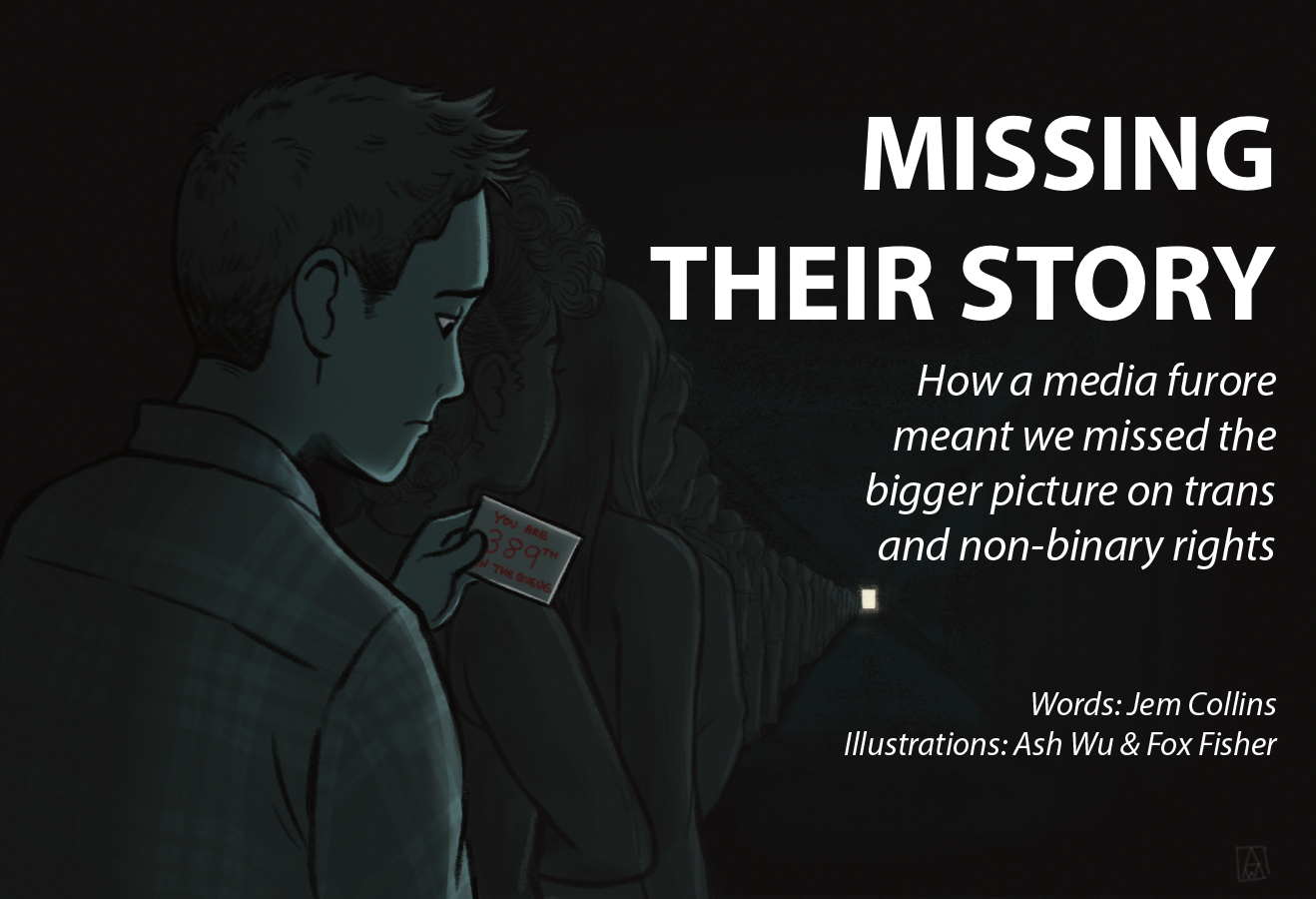When Giuliana Kendal decided to take her case to court, it was a decision she thought about carefully for a long time. “I’m no coward,” she told RightsInfo, “but I thought it might have serious implications.” Going to court can be a nerve-wracking decision for anyone, but for Giuliana it came with an added weight – she is a trans woman, and her case was to be heard at the peak of the furore about the Government’s Gender Recognition Act Consultation.
Ultimately, the Crown Prosecution Service (CPS) took over her private prosecution and discontinued it. But this story isn’t about her court case – it’s about the “floodgates” she knew would open by stepping into public life as a trans woman. “The level of intimidation was such that I was terrified of turning up at court,” she said after her first hearing last September. “Not from the point of turning up at court and standing on my feet, but from the point of view of my personal safety.”
RightsInfo has seen a dossier of allegedly transphobic social media posts reported to domestic abuse charity Galop. They expose Giuliana’s personal information, including private photos of her pre-transition, online. The dossier includes a receipt for an unsolicited pizza ordered to her home, addressed to her pre-transition name.
When I leave my house, I look left and right. I’m very cautious about answering the telephone. I’ve seriously thought about moving.
Giuliana Kendal
When first arriving at the courthouse on a crisp but sunny autumn morning last September, you’d have been forgiven for thinking there were just fringe protests, with only 15 people outside. By the time the case had finished for the day though, more than 100 people had gathered, waving signs and banners, singing and chanting. The majority of the talk and slogans weren’t centred around the case itself, instead focusing on the ongoing consultation into the rights of trans and non-binary people.
“No Self-ID,” read one banner, while another displayed the dictionary definition of a “woman”. Other protestors sang songs asserting that “if he wasn’t born a woman he’s a man”, talking about “lopping off” a penis. “They have intimidated me,” Giuliana told RightsInfo, after leaving the court from a different entrance. “They have made me frightened and they have made me scared. And when I leave my house I look left and right. I’m very cautious about answering the telephone. I’ve seriously thought about moving from my house.”
‘It Was Strange How Actually I Wasn’t Surprised In The Slightest’
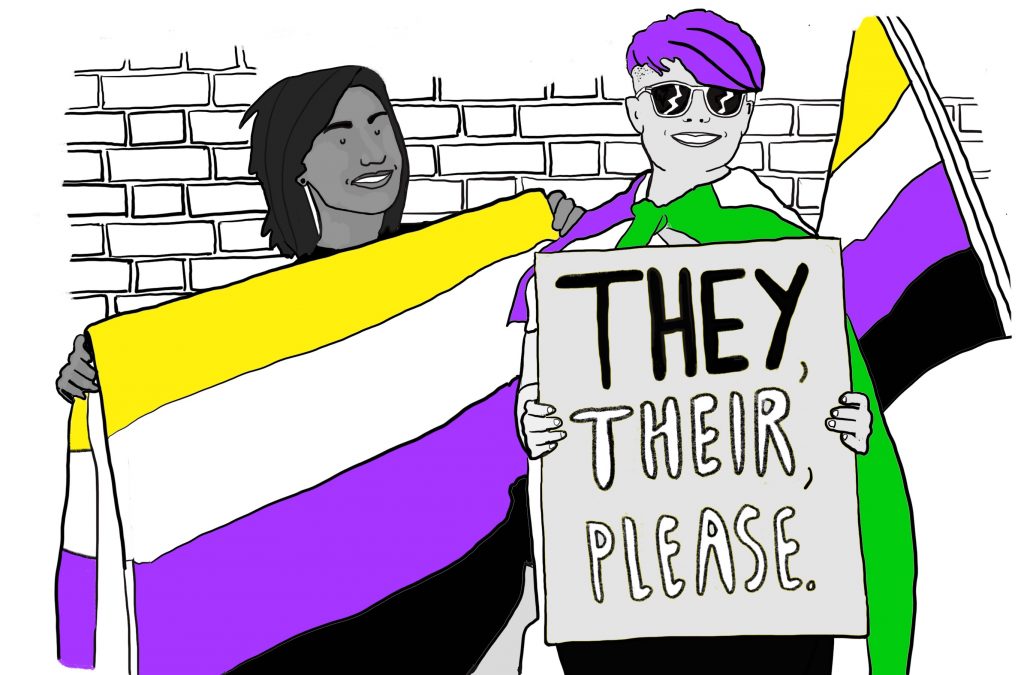
Illustration: Fox Fisher
Giuliana wasn’t the only person to have felt that the conversations around the consultation had gone too far. As the deadline for submissions drew nearer, the interest and heat surrounding the proposals only grew, with an almost 100 per cent rise in Google searches for the ‘gender recognition act’ in the two months leading up to October 2018. Some 53,000 people responded to the proposals, which aimed to look at ways to update The Gender Recognition Act of 2004 to protect human rights for all of us. Just one per cent of a potential half a million trans people in the UK have legally changed their gender so far.
A toxic spew of headlines has frequently pitted women’s rights against trans rights, and the momentum had been building for some time. “When it was coming up for review and things got really nasty, it was strange how actually my brain went ‘well, yeah ok'”, reflected Jezza Donovan, who identifies as non-binary and works to support LGBT+ rights in the UK. “I wasn’t surprised, but I was unendingly appalled at just the lies and rubbish.” UK newspapers The Sun, The Times, Metro, The Telegraph and The Daily Mirror were forced to defend themselves in a Parliamentary Committee against claims they were “fuelling anti-transgender moral panic” in April 2018, just months after former Labour Leader Ed Miliband compared their coverage to 1980s homophobia.
I was just unendingly appalled at just the lies and rubbish. The other day I read a piece and I just had such a burning flash of rage I went up into my bedroom and screamed into a pillow.
Jezza Donovan
Headlines such as “the skirt on the drag queen goes swish, swish, swish” openly conflated trans issues with drag, while ideas like “children were being sacrificed to appease the trans lobby” made their way into both broadsheets and tabloids, with one piece claiming that trans rights were “tight[ening] their demented grip on our society”, while destroying women and children’s rights. “You become fairly hardened to it,” added Jezza. “But the other day I read a piece and I just had a burning flash of rage where I just thought I’ve just got to stop. So I went up into my bedroom and screamed into a pillow. I think a lot of people felt so ragingly angry and furious, because I saw the damage it was doing to me and people like me.”
Even for reporters trying to cover the consultation in a more balanced way, the backlash could be intense. Ella Braidwood, a journalist for LGBT+ news outlet PinkNews said that while the weeks building up to the consultation got “really intense”, she hadn’t predicted the backlash she’d receive.
“In terms of stuff I’ve written on social media, the trans-exclusionary radical feminists have been aggressive,” she told RightsInfo. “If I post an article they will comment loads and try to preach to me what they think a “woman” is and often focus on genitals – all about penises, you can’t be a woman if you have a penis etc. Really childish, aggressive, and personal remarks to try and scare and intimidate and upset trans people.”
It felt intense for me and I’m not personally affected. I can’t imagine the impact on trans people. I don’t think people realise that it is actually leading people towards the edge.
Ella Braidwood
“For the weeks getting up to when the public consultation closed it got really intense,” she continued. In particular, a piece she wrote for Metro.co.uk about why cis lesbians should stand up for trans people’s right to self-identify was targeted. “It felt intense for me, and again, I’m not personally affected, but in terms of the abuse received… yeah. For me, it’s not personal and I still find it really upsetting. I can’t imagine the impact on trans people. Having spoken to trans campaigners, a lot of them have said it’s really damaging their mental health, and some of them are being pushed to the edge. I don’t think people realise that it is actually leading these people towards the edge in terms of their mental health.”
Four out of 10 trans people have suffered a hate crime in the last 12 months, according to government figures, while a quarter have been homeless at some point, and two out of three have been afraid to be open about their gender. A recent study from Stonewall also found that more than one in four young trans people have attempted suicide, with nine in ten thinking about it.
‘The Sky Certainly Hasn’t Fallen Because Of Trans People’
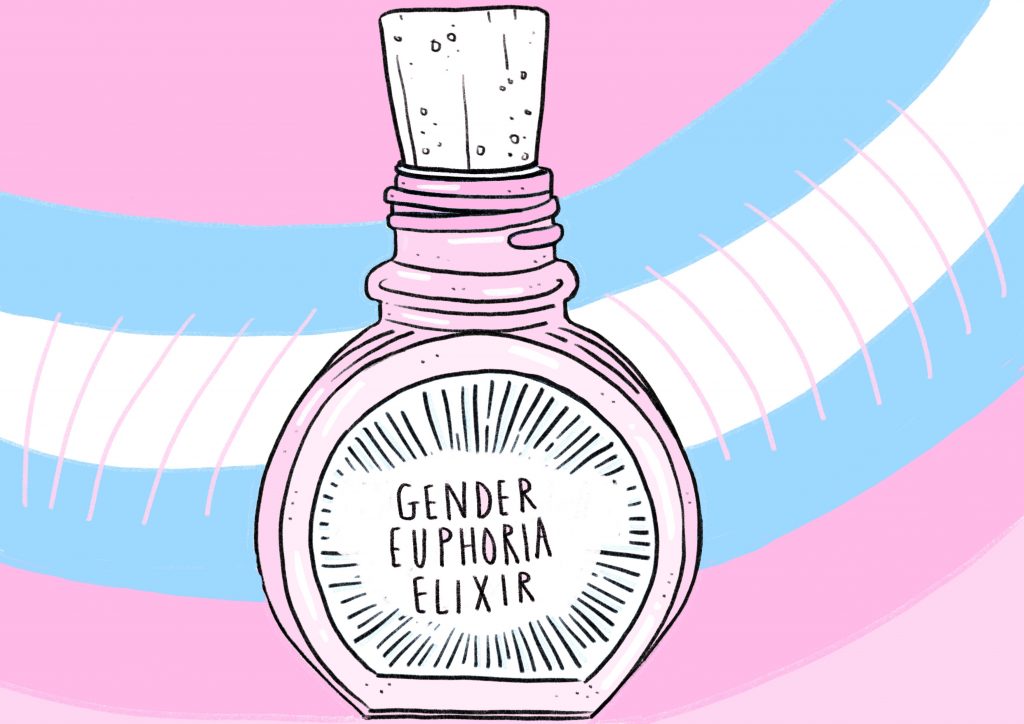
Illustration: Fox Fisher
But just what were the proposed changes that caused such an outpouring of hatred as experienced by Giuliana and Ella? In essence, the Gender Recognition Act Consultation set out to reform the lengthy, bureaucratic process by which trans people are able to change their gender on their birth certificate. “In summary, the reforms aim to make it easier for trans people to legally change their gender that was assigned at birth,” Allan Briddock, a barrister who works with the Trans Equality Legal Initiative told RightsInfo.
He points to several reasons for the “very low-take up” of Gender Recognition Certificates (GRCs), including being required to present a mental health diagnosis of gender dysphoria – despite the fact it is not considered a mental illness under UK government policy or by the World Health Organisation. If married they would also have to seek the approval of their spouse. In addition, trans people must live in the gender they wish to identify as for two years before they are able to apply for legal recognition, as well as pay a £140 fee. There is also no legal system to allow for people who identify as non-binary, meaning they identify as neither a man or a woman.
In my opinion, and most likely in the opinion of the vast majority of trans people, trans rights organisations and trans-rights lawyers, there needs to be far more protection for the trans community.
Allan Briddock
However, despite a report from the Scottish Government condemning the current system as “intrusive and onerous” and the UK government also issuing a release during the consultation period condemning “inaccurate speculation” in the press, there have been some concerns surrounding the proposed self-ID system, which would allow trans people to self-declare their gender without the need for a medical diagnosis.
The criticisms have mainly focused on the impact the changes could have on women-only spaces, such as bathrooms, hospitals, prisons, and shelters. However, “this would not literally be a declaration of gender which would then be legally enforceable”, explained Allan, “but rather a far less onerous process than currently in the GRA. For example, a statutory declaration would be required and there would be a requirement for a ‘lived in’ gender period.”
All claims made that trans rights are infringing on anyone else’s rights have little place in reality, and anyone who does a little bit of research will find that there have been no issues in countries where this is a possibility.
Owl
Trans women also already have the right to access services equally to cis women (women whose gender identity corresponds with their birth sex), apart from in some limited circumstances. The 2010 Equality Act already safeguards both sex and gender reassignment as protected characteristics – meaning a trans woman can’t be discriminated against – and guidelines from the Equalities and Human Rights Commission state that there is “no requirement for a trans person to have any kind of medical supervision or intervention” to receive these protections.
In short, self-ID already exists in some cases, though Allan stressed the lack of trans people accessing GRCs means they are not currently afforded the full protections the Act offers them, instead relying on the Equality Act 2010 and Article 8 of the European Convention on Human Rights, which protects private and family life. “In my opinion, and most likely in the opinion of the vast majority of trans people, trans rights organisations and trans-rights lawyers, there needs to be far more protection for the trans community,” he concluded.
Owl, a non-binary trans campaigner and writer, also points to other self-ID systems already in place across the globe, including in countries such as Ireland, Malta, Denmark, Portugal, and Norway. “All claims made that trans rights are infringing on anyone else’s right have little place in reality,” they explained. “And anyone who does a little bit of research will find that there have been no issues in countries where this is a possibility. And the sky certainly hasn’t fallen just because trans people were given the right to determine who they are.”
‘People Don’t Want To Hear That We Are Failing Trans People’
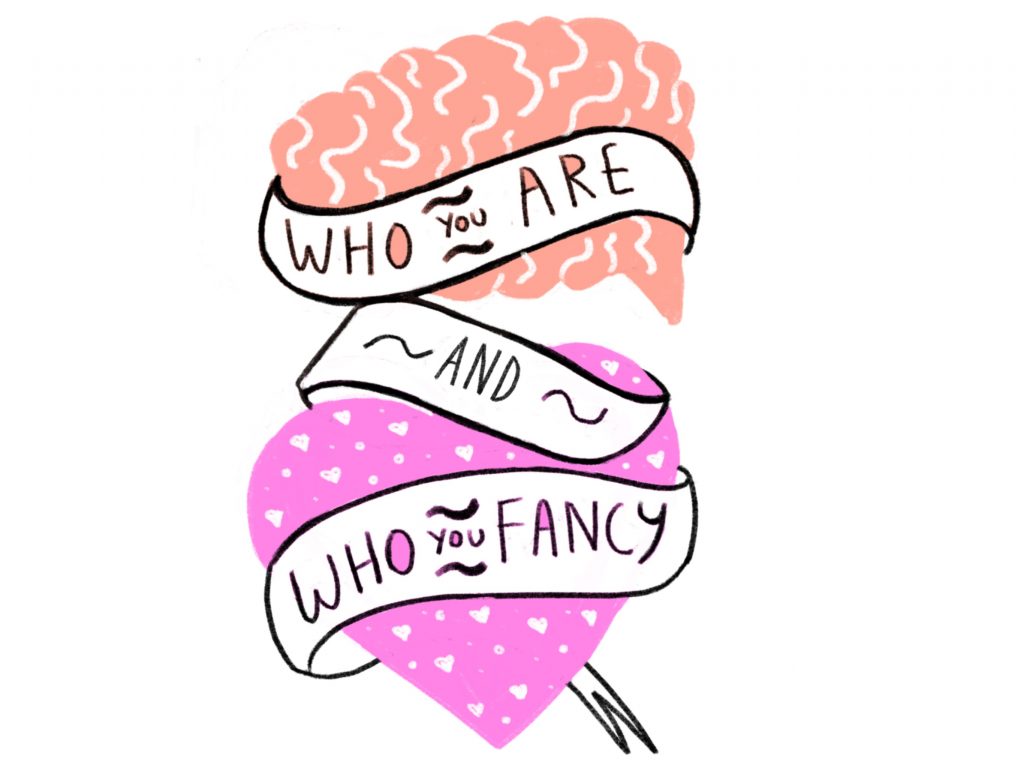
Illustration: Fox Fisher
Moving beyond the headlines and hyperbole, there’s a danger we could be missing the real stories surrounding trans and non-binary issues, blinded by the anger surrounding the GRA debate. For Fox Fisher, a non-binary campaigner, artist, and filmmaker, while trans and non-binary issues are “finally coming to the forefront” and helping to “bring deeper understanding”, “tensions are also rising”.
“The media constantly gives platforms to stories or narratives that have little place in reality or factual evidence behind them,” they continued. “Most people that are speaking out against trans rights have never even had a real conversation with a trans person, nor spent any valuable time getting to know the community or the issues we face. How can someone be seen as qualified to talk about a topic without any relevance to it?”
Most people that are speaking out against trans rights have never even had a real conversation with a trans person, nor spent any valuable time getting to know the community.
Fox Fisher
It follows on naturally, that if a community feel the reporting about their issues is inaccurate, there are most likely stories which aren’t being told. That’s “definitely” the case according to Owl. “Topics that make people have to face the hostile reality that trans people experience rarely get as big of a platform, whereas any topic which shows trans people as bad, aggressive, or somehow divisive will instantly make a story. Anything with the word ‘gender-neutral’ instantly becomes a story, while issues of discrimination, dehumanisation, and lack of access to services aren’t seen as a relevant story to cover. People don’t want to hear that we are failing trans people, they would rather see us as a problem and a nuisance.”
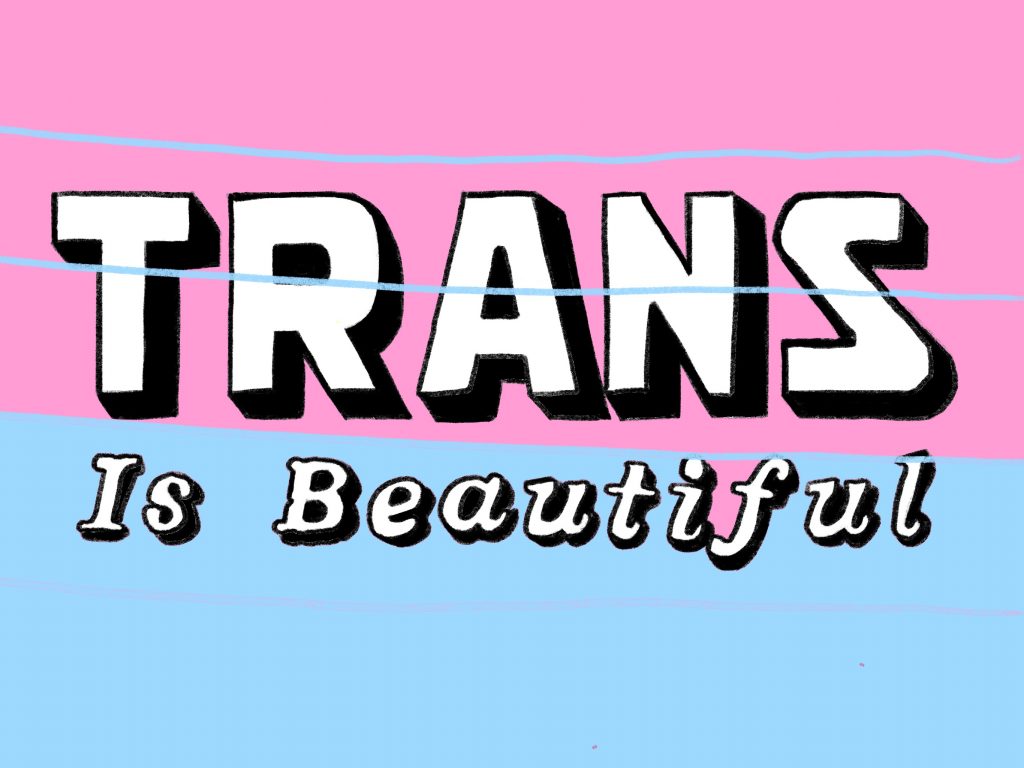
Illustration: Fox Fisher
Even setting negativities momentarily aside, for Jezza it’s about a lack of stories across the spectrum – about trans men as well as women, about non-binary people, and more positive stories about normal, everyday people. “There are people who are plumbers, and teachers, and people who work in shops who also happen to be non-binary. I think we need to tell more positive stories, and, I think telling more trans stories, that’s the most important thing.”
There are people who are plumbers, and teachers, and people who work in shops who also happen to be non-binary.
Jezza Donovan
It’s part of the rationale behind All About Trans, a non-profit initiative which aims to improve understanding of trans people and promote trans voices in the media through non-confrontational interactions between journalists and trans people. Freddy McConnell, one of the programme’s volunteer facilitators, and also a journalist at The Guardian, said for him it was about giving “overworked, time-poor journalists the chance to actually meet a trans person – and not just for a story, but just two individuals […] two people having a chat and getting to know each other”.
‘It’s Just To Remember There Are People Behind This All’
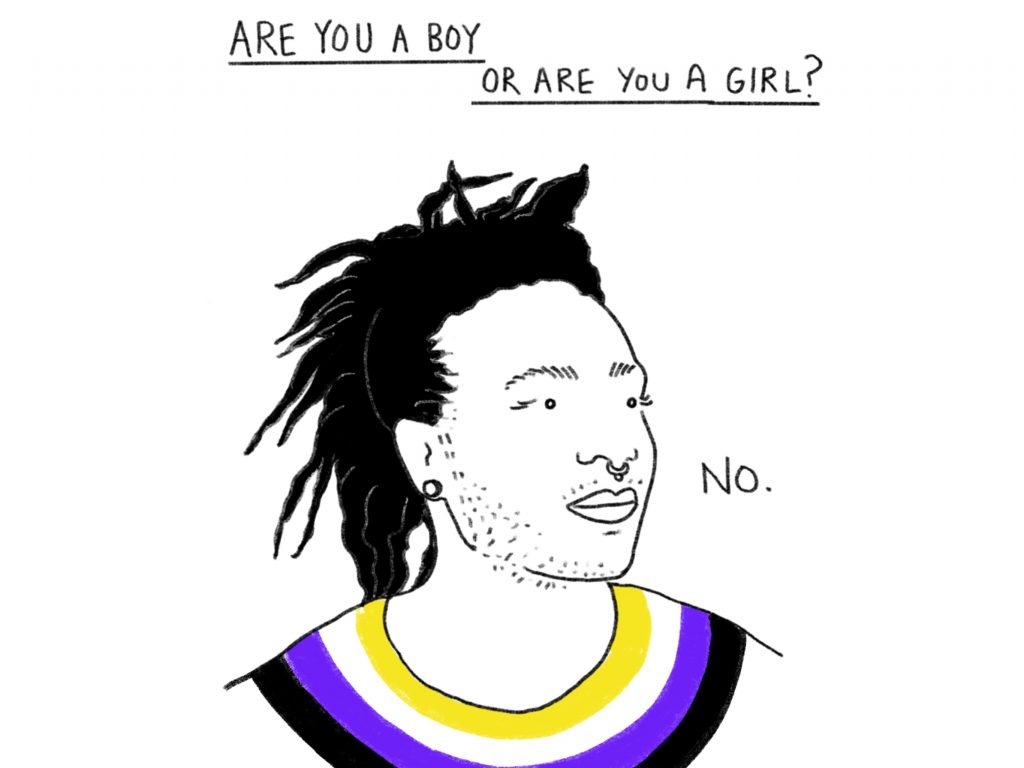
Illustration: Fox Fisher
As a reporter and trans man himself, Freddy believes that things like budget cuts, a lack of time, and pressure in the newsroom play a role in “inaccurate or superficial reporting that just repeats the loudest voices, no matter how biased, or angry, or ill-informed they are, or that these debates aren’t being had in good faith”, adding that while “the vast majority of people don’t have any ill will or prejudice”, they lack the “expertise” or “wider context”.
“Even just an hour meeting someone,” he explained, “meeting a person rather than it just being a set of issues you’ve been asked by your editor to summarise, just to remember there are people behind it all and to remember it’s not just all shouty opinions and numbers – that’s not really the ultimate thing they’re supposed to be focused on here. By meeting a trans person, it’s not the solution, it’s not the ultimate cure-all, it’s hopefully just helping them pause, and take a breath and think OK, does this all sound hysterical and heightened?”
Even just an hour meeting someone, meeting a person rather than it just being a set of issues you’ve been asked by your editor to summarise.
Freddy McConnell
While the government have yet to set a timeframe for analysing and implementing the results of the GRA consultation, for Freddy it’s also crucial to stress the emphasis is not on the trans and non-binary community to fix the media. “I just think, yeah, this is really shit, but ultimately we can’t take on fixing the media on top of trying to improve lives for ourselves, and our families and our loved ones,” he added.
I wish some people would realise it’s not about you guys.
Freddy McConnell
“Sometimes you get people collectively deciding not to engage and then we get accused of no platforming, I wish some people would realise it’s not about you guys. We’re sometimes exhausted, we’re under a lot of strain from society for just being who we are, and I think we choose sometimes to focus on stuff that isn’t in the headlines, [instead] focusing on charity work, or volunteering, or youth groups, and lobbying in organisations like the NHS which have a much more direct impact on a lot of trans people’s daily lives. It’s not because we’re giving up, it’s because there are better places to focus our limited energy and resources.”
EDITOR’S NOTE: This article was amended on Friday 21 June 2019 to indicate that RightsInfo had seen a dossier of evidence of allegedly transphobic tweets aimed at Giuliana Kendal. It also clarifies that the use of the term “outpouring of hatred” refers to the experiences described by Ella and Giuliana.
Featured Illustration: Ash Wu. All the illustrations in this piece were created by trans and non-binary artists. You can also see more and support the work of teli and All About Trans.

